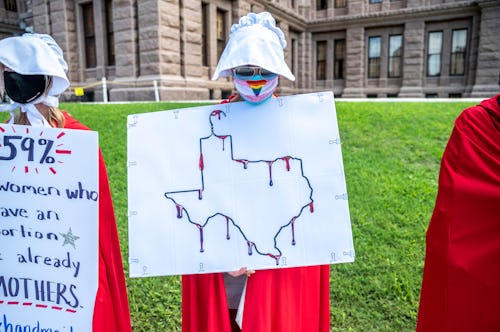"Heartbeat" abortion laws are based on a radical misunderstanding of science
You can’t hear a heartbeat at six weeks.

The state of Texas recently passed a bill that’s got everyone with a clue worried, to say the least: S.B. 8 bans abortions after six weeks. The law is up for consideration by the Supreme Court but until SCOTUS makes a decision — which they are expected to do this year — the ban is being upheld. This has put a major strain on Texas abortion providers and, well, anyone who believes in choice. Not only that, but medical experts say that the so-called “heartbeat” laws are based on a flawed premise.
Supposedly, the reasoning behind the anti-abortion crusade’s six-week mark is that by that time, ultrasound machines are able to detect a fetal heartbeat and therefore a live birth is possible. This premise, however, isn’t scientifically sound. Fetuses don’t actually have the organized muscle tissue that it takes to make a heart until about the 20th week of pregnancy, MedicineNet reported. Not only that, but most global medical experts agree that a baby does not have a viable chance of survival until the 24th week, according to the U.K.’s National Health Service.
What, then, is the heartbeat sound that ultrasounds find at six weeks? It’s the electrical pulsing of a tube of cardiac cells. “What you see and hear on an early ultrasound is embryonic activity — electrical currents being sent through cells that will develop at a much later time into a heart,” Gabriela Aguilar, an NYC-based obstetrician-gynecologist, told the New York Times. So sure, that tube of cells is a primitive version of what will eventually become the heart, but to call it a heart is kind of like calling an acorn an oak tree.
Some anti-abortion doctors also think that the electric pulse detected by ultrasound “counts” as a heartbeat. “It is a heart tube, but it is still a heart. The shape is different, but that doesn’t change the essence of what it is,” Christina Francis, chair of the American Association of Pro-Life Obstetricians and Gynecologists, told the Times. I am unconvinced by the argument that because a set of cells could potentially become an organ that they should be considered that organ, but you can decide for yourself.
In case it isn’t obvious why people who oppose choice would decide to consider this reverberation of electrical pulses a heartbeat, it’s because calling it a heartbeat is an emotional appeal in the guise of science. Many doctors think that making laws based on these kinds of obfuscations have deleterious effects.
“Laws that are written by nonmedical people to regulate the practice of medicine, or dictate what clinicians have to say to their patients, are dangerous and affect our ability to care for patients,” Nisha Verma, a fellow at the American College of Obstetricians and Gynecologists, told the Times. I don’t know why we’re debating whether the medical information disseminated should be true or not, but apparently we must. According to a recent study, one-third of statements about abortion made in patient materials gathered from more than 24 different states are scientifically inaccurate, reported NYT.
It’s not just that these laws are willful scientific misunderstandings, they have an impact on how medical professionals are allowed to care for their patients and how people make choices about their own care. These laws guilt pregnant people by making them feel like six-seek-old fetuses are basically small children based on totally erroneous facts.
People simply cannot make informed decisions based on misinformation meant to create a sense of shame, which makes these laws effectively near total abortion bans that also prevent doctors from giving patients correct information. Anti-abortion vigilantes call this compassion, but it sounds a whole lot like fascism to me.